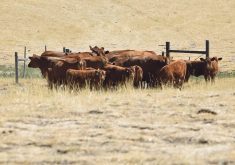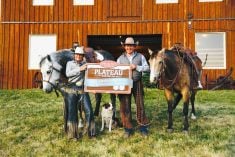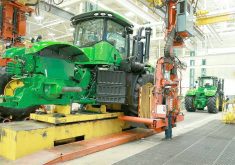It’s an ongoing issue in the Alberta ag industry, but the declaration of August 20 by the Alberta Federation of Labour as “Alberta Farm Worker Day,” brought it back into the news. I refer to the lack of mandatory Occupational Health and Safety (OHS) and Workers’ Compensation Board (WCB) standards and programs for those working on most, but not all, farms in Alberta — the last jurisdiction in Canada to not provide those rights to all paid farm, ranch and feedlot employees.
It also remains a curious political situation since Premier Redford stated as far back as her party leadership campaign that she would support the mandatory inclusion of all farm workers under OHS and WCB. I guess one should never underestimate the power of the farm lobby in this province. The opposition Liberal and NDP parties take delight in reminding the premier of that promise at every opportunity.
Read Also

Deep cuts to ag research jeopardize Canada’s farming future
The huge cuts to ag research at Agriculture Canada are being widely panned by farm organizations, but there seems to be little hope of the government reversing its decision.
Liberal Ag Critic David Swann raised the political embarrassment by referring to the need for these regulations in food production as being part of producing “ethical food,” a clear poke at the government’s perspective that it produces “ethical oil.”
However, the government seems unmoved and appears to have dug in its heels. It had appointed an industry-stacked farm safety advisory council, which to no surprise, advised the government that voluntary measures were sufficient and no mandatory programs were needed. None of that makes the issue right, and deaths and injuries continue on Alberta ag operations. It’s a national disgrace.
Now a labour situation at the JBS operation in Brooks has brought the issue into a new perspective. That operation has always had two components, a slaughter facility on one side of the highway and a large feedlot on the other. Workers on both sides deal with the same cattle albeit in different ways. However, workers in the plant are covered by OHS and WCB whilst workers at the feedlot are not, since it’s deemed to be a farming operation.
Since its arrival JBS has turned out to be an enlightened owner/operator when it comes to good labour relations so I expect it would not be too concerned about OHS and WCB for its feedlot workers. The problem is it would set a precedent for the feedlot industry. One would expect the plant union to want to get involved, since that the rights of their fellow feedlot workers should be a priority for the union. That situation may yet unfold and JBS may become an industry leader over the issue.
That brings into question OHS and WCB coverage of farm workers at government research facilities and universities (the University of Alberta actually operates various types of farms and ranches). How do those operations justify their coverage or lack thereof, for their farm workers? I expect as unionized government workers they are covered, even as farm workers. From personal experience in the past the Alberta government demanded that any workers or contractors who received support from a government research grant had to have WCB coverage. Those projects involved workers in agricultural work settings. Why is there such a difference in government actions — rules and benefits for some but not others?
Challenge
To try and provide some food for thought for this stalled issue, here is a challenge to the various actors in this ongoing drama.
The Alberta Federation of Labour needs to sponsor a study as to which of its member unions, including public-sector unions, have farm worker members who are covered by OHS and WCB (universities, research agencies etc.). If they are not covered perhaps they need to start a campaign to get them covered to set an example. If they are covered, the federation needs to launch a study into how coverage of their farm worker members has resulted in fewer injuries and deaths than the provincial average, or not, as the case may be.
The Alberta government needs to address some of the hypocrisy in its present legislation. How come farm workers in greenhouses, mushroom farms, turf farms, and maybe their own research facilities and universities are required to be covered by OHS and WCB but other commercial farm production sectors are not?
For instance, a farm worker tending and harvesting vegetables in a greenhouse has mandatory coverage. But a farm worker tending and harvesting the same vegetables on a commercial outdoor farm is not required to be covered. Are we to assume that mandatory coverage is needed for indoor farm work because it is radically more dangerous than outdoor farm work? I would suggest the opposite is more likely.
There also needs to be a study into what role insurance companies play in this issue. Big commercial ag operators and their bankers are quite aware of their liability exposure from farm worker accidents and deaths. They pay insurance premiums but what does that provide them and their workers? Are there significant shortcomings for both sides? Maybe a study would show that compared to other provinces, private liability insurance is cheaper and more effective in keeping down farm injuries and death on an equal basis than mandated government OHS and WCB. What about a mix of public and private coverage — is there a better hybrid alternative to this issue? The issue needs to be better understood from this side.
There are also questions for the federal government. How can it approve foreign farm worker applications for Alberta when it knows that those workers will not receive the same OHS and WCB protection and coverage as the same workers in every other province? One might see this as those working under that program as being discriminated against if they are sent to work on Alberta farms. The rules, regulations and the benefits should apply to all those workers, not everywhere except Alberta.
I believe there is enough food for thought there for everyone on all sides to take some action to bring some further perspectives and some common sense to the table. There are two realities in this issue. Firstly, indications are that mandatory OHS and WCB coverage in all the other provinces has not devastated their commercial agriculture sector. It’s unlikely to cause major hardship on the commercial ag industry here particularly if it’s introduced incrementally. Also the big operators are familiar with a lot of the aspects being they buy liability insurance to deal with worker lawsuits.
Secondly and most important, let’s not forget this issue involves real people and life-altering experiences. Victims, the injured, survivors and families deserve to be fairly treated the same as any other workers in this province. This is 2013 and not 1913 — everyone deserves to be respected including farm workers and their rights to OHS and WCB.













